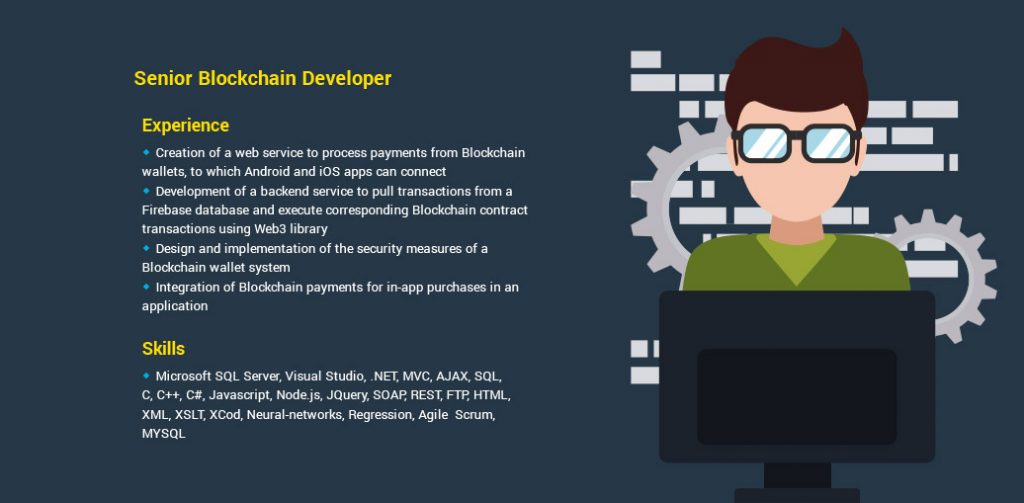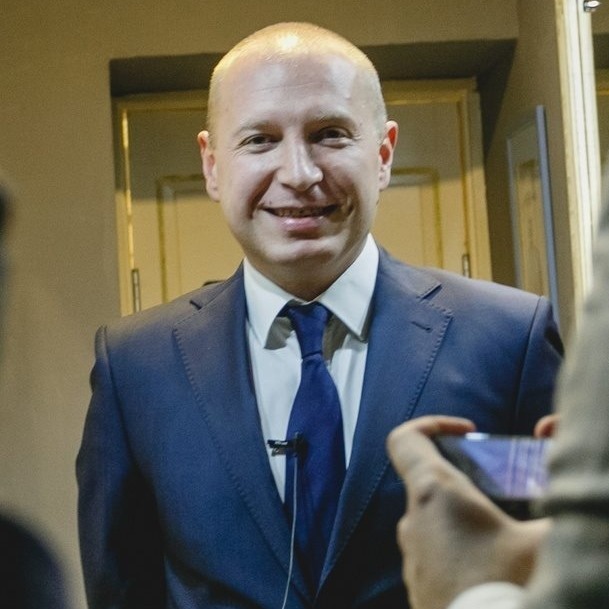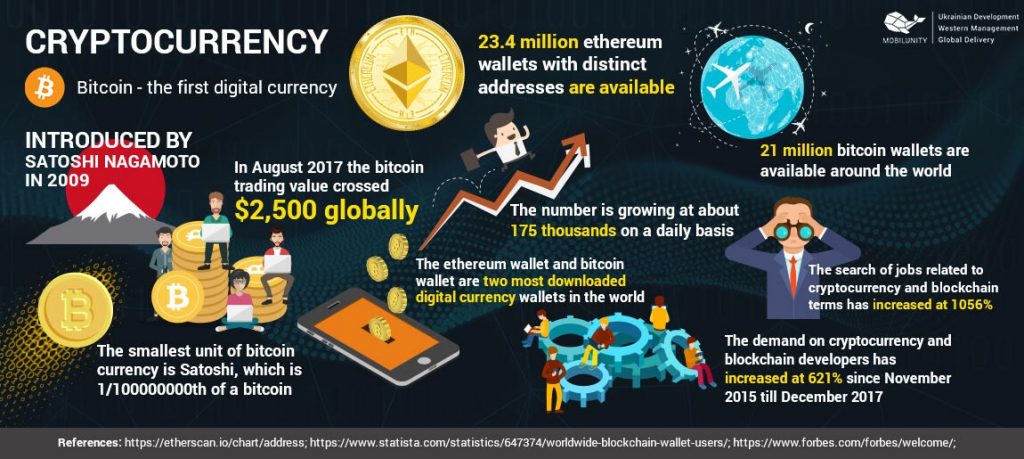Unless you are living in a world without civilization, you may have come across the term blockchain programming. However, if by any remote chance you haven’t, then you may have seen it in action. This is because blockchain technology has been the core driving technology behind Bitcoin. According to IT industry veterans, on top of being used in the cryptocurrency space, blockchain technology is set to re-engineer the way we do things akin to what the Internet provoked. For starters, what is blockchain and how to use blockchain?
Blockchain is a digital ledger of facts arranged in data blocks. These data blocks are then linked to each other via cryptographic validation. It is through these unbroken linkages that a blockchain is formed. A blockchain allows multiple parties on the data blocks to remain anonymous and securely share data. This shared data can be anything although the technology emphasizes on information that requires a third-party to change hands. For example, you may require a bank to exchange money for an online transaction or a lawyer to prove ownership of property. What blockchain does is to eliminate the need for all these third parties.
How Does Blockchain Work
Blockchain technology is an innovation ride on three major concepts. Public-key cryptography, peer-to-peer networks and distributed consensus all of which rely on an indiscriminate mathematical challenge. All these concepts aren’t entirely new as they have been around for quite some time. However, it’s the combination of all these concepts that is giving birth to the computing breakthrough.
Once a blockchain receives a new transaction request or an existing transaction edit, all the data blocks within it will execute algorithms to establish the authenticity and history of the individual proposed transaction. Once the data blocks establish that the signature is valid, the ledger accepts the proposed transactions creating a new data block creating a new chain of transactions.
On the other hand, if a majority of the data blocks don’t grant the addition or modification, the ledger entry is denied. It’s this distributed blockchain architecture that allows blockchain to run an endless list of distributed ledgers without the need of a unifying authority that determines what transactions will go through and those that aren’t valid.
How to Use Blockchain in Various Sectors
- Unmatched IoT security
Although blockchain development was first tried and tested on Bitcoin and Ethereum developers and the public, in general, starts to realize that the technology’s real clout is yet to be unleashed. This is because unlike conventional technologies, the decentralized data structure used in blockchain technology has proven to be useful for other industries too. We all know that over a long period of time, hackers have always had a recreation haul when it comes to IoT. In 2016, the Mirai DDoS attack was just a wake-up call and an indication of how vulnerable IoT devices are.
Blockchain’s distribution system does not lie in creating multiple authentication layers but in the distribution. Since blockchain solutions function through distributed, encrypted, and shared ledgers across network’s users, it results in a network of validation that can be verified, traceable, and hard to hack. By implementing blockchain, a device has to go through the entire ledger to gain access. In this scenario, unless a hacker modifies the entire ledger, the Mirai scenario becomes considerably difficult.
- Smart contracts
Smart contracts blockchain has become a buzzworthy phrase since the Ethereum Project debut in 2013. Although complex, the potential of smart contracts’ goes beyond the day to day transfer of assets. They can be used to effect transactions in a number of different fields, from processing insurance premiums, legal processes, to crowd-funding agreements.
In the future smart contracts are also believed to bring about a disruption in the financial and legal fields. They will simplify and automate routine and recurring processes which most people pay loads of monies to banks and lawyers. Additionally, the ability of smart contracts will also play an important role in controlling behavior in terms of compliance.
- Digital voting
In today’s world, voting is a tiresome process where people stand in a queue for extended periods of time just to choose their leadership. What if all that can change and you start voting right from the comfort of your bed? Online voting has always faced one common denominator which is security. This is because hackers can hack into the voting systems and tamper with the results. Blockchain implementation gives voters their fundamental right to vote without necessarily disclosing whom they voted for in a secure manner. That notwithstanding, countries with low voter turnout can also leverage on the technology to bring more people to vote.
- Distributed storage
Presently most people use storage services like Dropbox and Gdrive, to store files. The problem with these services is that they aren’t immune to institutions like governments that can compel them to disclose your information. However, on Blockchain, data is decentralized and stored in multiple high encrypted devices on the network. This not only reduces potential data breaches but also reduces costs.
- Supply-chain communications
Most products that we buy today aren’t manufactured by a single entity. This means there are multiple raw materials and logistics suppliers for a particular product before it hits the market. The problem with such a system is that if a single component in such a space fails, the entire brand will have to absorb the backlash. Using blockchain technology helps come up with auditable digital results that clearly pinpoint the stage at which the product has reached within the value addition chain.
How to Become a Blockchain Developer
We are living in the blockchain era. This compounded with the myriad of other future possibilities, the impact if the technology is set to be magnanimous. With that said, how can you get a slice of that “blockchain action?” Since the turn of 19th century, the world has rapidly evolved to the extent of dwarfing the Industrial Revolution. Manual laborers that greatly contributed to the agricultural industry incurred massive losses with the mechanization of farming.
Today we are experiencing the same revolution. The only difference this time is the blockchain technology and AI replacing the human beings. Even better, this human replacement is happening at a rapid rate and at a much larger scale. In the next few decades, intelligent computer systems will replace almost every job there is. True to that, Bill Gates recently indicated that the blockchain technology will be at the helm of this revolution. This is because the technology’s versatility renders it compatible with almost every industry, as long as it offers robust technical architecture.

According to Fortune, the number of cryptocurrency related jobs saw an increase of over 306% in 2016. LinkedIn saw an even dramatic increase of 5,753% in 2017 with the numbers expected to soar higher this year. The dramatic increase in the jobs has also seen the salaries reach unprecedented levels. A report by ComputerWorld shows that the average annual salary of a blockchain developer is $158,000 in Silicon Valley.
By 2025, the blockchain space is predicted to hit a few hundred billion dollars. Although this estimate is just a placeholder, it could be much more depending on how institutions and governments will respond to the technology’s sweeping transformations. Simply put, it may it may be hyped, but it should certainly never be underestimated.
Career options in the industry
You may tend to think that companies will only hire blockchain developer to do all the other things related to the job title. This is absolutely wrong. The technology has several sub-specialties that bring multiple career options.
- Project Manager. Any business in 2018 thinking of incorporating blockchain solutions into their business model must definitely hire a project manager who can succinctly communicate their idea to the developer.
- Community Support. Most of us can admit that we have at one point almost invested in cryptocurrency even though we didn’t have the slightest idea of what it was. Therefore almost every company in the industry will find the community support position rather important due to the esoteric nature of the industry.
- Developer. Blockchain developers are having the last laugh as they are set to take a majority share in terms of career opportunities. To optimize and make their business models better, tech companies, banks, insurance firms, governments, and others are incorporating blockchain into their operations. This has created endless opportunities for developers to write a blockchain code or even develop a blockchain app that can run their business platforms.
- Lawyer. As smart contracts increasing become the norm, the number of businesses looking to incorporate them into their processes has also increased. Lawyers are increasingly getting involved in the structuring and the governance of Initial Coin Offerings.
- Designer. All startups in the blockchain ecosystem that are looking to host token sales will definitely need a webpage where they can interact with customers and potential investors. Web-designers should be smiling as the demand for their skills will also soon become a necessity.
Required Skills
Right off the bat, blockchain technology field is pure programming hence computer science intensive. Different coins and blockchains use a particular blockchain programming language. Bitcoin is built on C++, Ethereum runs on both C++ and Python, and Dragonchain supports Python, Java, NodeJS, C#. On top of these multiple language skills, web development skills are equally important as a blockchain developer. As an added bonus, networking and security skills will also come in handy as you may occasionally be required to engage in back-end development work.
A CV sample of junior blockchain developer would typically include:
- bug fixing of mobile application with blockchain wallet integration;
- analysis and design of apps that support Bitcoin and Ethereum payments;
- RSTful web services that use blockchain API;
- Skills in Python, Django, C++, HTML, CSS, JavaScript, Node.js, MySQL.
A middle-level developer, in addition to those, would have to be able to set up online payment systems supporting blockchain wallets, creating dashboards, etc. And, finally, a sample of senior blockchain developer.

Final Thoughts
There is never a ripe moment to join the blockchain movement as an insider. Even the most experienced developers like Vitalik Buterin are learning as they progress and the chances of succeeding are high. Nevertheless, the fundamental tools of developing blockchain applications virtually remain the same. You can find a blockchain tutorials, videos, and guides online, as well dedicated developer teams. So if you are interested in changing the world, nothing is too technical in the field for you to circumvent.


